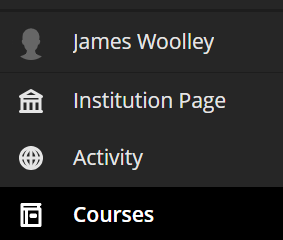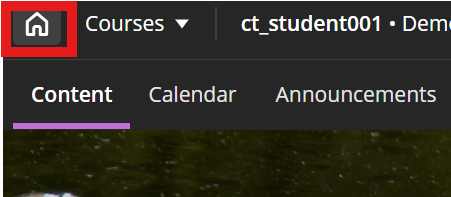
Panopto will be unavailable between 22:00, Saturday 21 March 2026 and 01:00 Sunday 22 March 2026 for scheduled maintenance.
We apologise for any inconvenience caused.

Panopto will be unavailable between 22:00, Saturday 21 March 2026 and 01:00 Sunday 22 March 2026 for scheduled maintenance.
We apologise for any inconvenience caused.

We had the pleasure of recently presenting at the Blackboard User Group on the Exemplary Course Award that we run here at Aberystwyth University. Blackboard run their own Exemplary Course Programme which we use as the basis for our award.
The session title, Celebrating Excellence, Shaping Practice: Aberystwyth University’s Exemplary Course Award Programme, charted the history of the event here at AU.
We’ve been running the ECA since 2014. In that time, over 50 modules have submitted applications.
Since the start of the award, we’ve had applications from all sections of the University. Those that offer on campus teaching provision, Lifelong Learning Courses, Distance Learning Courses, Welsh language and English medium courses, large and small courses have all been recipients of the award.
In the presentation, we gave an overview of how we manage the process and discussed the impact of running the award over the last 12 years. The ethos of the process has always foregrounded reflection giving applicants the opportunity to enhance and refine their course before submitting.
We’ve looked at the ways in which we have marked success over the years, as well as the changes we have applied to streamline the process.
We also discussed how we might change this for the future. We are exploring ways in which the student voice can be brought into the nomination process. We’re also considering running smaller awards alongside the Exemplary Course Award – an award that focuses on each of the 4 criteria: Course Design, Assessment, Interaction and Collaboration, and Learner Support.
We were joined by previous award winners: Lauren Harvey (Law and Criminology) and Mari Dunning (Lifelong Learning).
Both Lauren and Mari spoke about their courses as well as their experience of engaging with the process.
Colleagues are welcome to submit a direct application to Blackboard’s Exemplary course Programme.
Slides from our presentation can be downloaded here:

We are pleased to announce our next Mini Conference taking place on Tuesday 14 April 2026.
In collaboration with the Department of Psychology, Student Accessibility and Wellbeing, and the Digital Education Team (Student Journey), we are looking for 15-minute presentations on the following topics:
Please fill out this form to submit your proposal.
Please indicate in the proposal if you are comfortable taking questions for 5 minutes at the end of your presentation. Please submit your proposal before Friday 6 March.
Booking for this in-person event is already open. You can book your place via the staff booking system.
We will be providing light refreshments. Please include any dietary requirements in the additional requirements field of the booking form.

Turnitin will be unavailable between 16:00 and 22:00 on Saturday 7 February 2026 for scheduled maintenance.
During this time, you will be unable to submit or grade any assessments.
We apologise for any inconvenience caused.

Now that semester 1 teaching has finished and we are moving towards the assessment period, we wanted to write a blogpost to highlight the analytical reports that are available in Blackboard.
These reports can be used to monitor Blackboard usage and engagement and help you to re-enforce messages to students.
By default, the student progress summary is enabled on all content items in Blackboard courses.
This allows Blackboard to record when content has been opened, and students are able to mark tasks as complete.
To access the report, click on the … to the right of the content item and select Student Progress:

There you’ll see the progress report:

From this page, you can also filter students by those who have unopened the content, those who have started it, and those who have marked it as complete.
If you apply a filter, you can message the highlighted students using the message button.
Using Blackboard tests? You can run a report to analyse the questions with:
In addition to this, it also allows you to re-examine questions with the Discrimination report. This indicates how well questions differentiate between students across all levels.
The difficulty report indicates which questions are easy, medium and hard.
To view the report (once the test has ended), navigate to the test and select Question Analysis:

The report will run and you will receive an email once it has completed:

Making use of Discussions in your Blackboard course? Then you can run a report for the overview which will give you the total number of active students, the average number of posts per students, as well as the average wordcount for blogposts.
You can click on Student Activity for the overview:

You can use the message feature to contact students who haven’t engaged, as well as see the top participants, and the responses with the most replies.
The Course Analytics page allows you to flag alert settings for students based on the amount of time spent in the course and the dates since their last access.
Choose Analytics from the top menu:

You have two views:

For further information on using the Analytics feature, see Blackboard Help: https://help.blackboard.com/Learn/Instructor/Ultra/Performance/Course_Reports/Course_Activity_Related_to_Grades
If you are interested in looking in more detail at course analytics, we are holding an online training session on Monday 9 February between 15:10-16:00. You can book your place online via the training booking page.

Happy New Year!
Just before the Christmas vacation period, we hosted our final event of the year: a mini conference on Generative AI.
The materials from this Mini Conference are now available on our webpages.
Thank you very much to our presenters from the Departments of Computer Science, Geography and Earth Sciences, and the School of Literature and Languages.
And a special thank you to our external speakers: James Fern and Richard Mason from Bath University who gave us a brilliant overview of the two-lane approach to assessment design that Bath is currently working through.
We look forward to welcoming you to one of our upcoming events.

We’ve had some fantastic experiences and milestones this year.
Back in March, we announced our 2025 Exemplary Course Award and highly commended recipients.
In April, we hosted a Mini Conference on Employability and the Inclusive Curriculum in collaboration with colleagues in Careers and Employability.
In July, we had our 13th Annual Education and Student Experience Conference with over 200 attendees across 3 days.
At this event, a new Education and Student Experience Award Fund was announced, and we confirmed the recipients of these in November.
In November, we took part in Blackboard Ally Fix your Content Day, making the content of our Virtual Learning Environment even more accessible. We placed 3rd in the UK and 60th on the international leaderboard.
From a technical perspective, we’re really pleased with the introduction of automatic captions on lecture recordings, Blackboard’s Learning Object Repository, badges and achievements, and the e-submission review.
And we’re rounding the year off with a Mini Conference on Generative AI on Thursday 18 December. We’ve got a fantastic programme and there is still time to book your place.
We’re excited about what 2026 will bring in the Digital Education arena.
Some initial things that we’ll be working on and want to draw your attention to.
Applications for the Exemplary Course Award 2026 will close on Friday 30 January.
On January 8 there will be a minor update to the Blackboard interface.
We’re planning our next Mini Conference in collaboration with colleagues in Student Journey for April 2026. Further information will be made available soon.
And our 14th Education and Student Experience Conference will take place between 8-10 September 2026. Keep an eye out for updates, call for proposals, and external speaker announcements.
We’ve got our training programme available on the booking system for Semester 2 for colleagues to book onto.
We’re looking forward to working further with you in 2026.
We hope you have a restful break.
Kate, Keziah, & Jim

On Thursday 8 January, there will be a minor update to the Blackboard interface.
There is no downtime associated with this update, and Blackboard will continue to function normally during this period.
These changes include:



In addition to this, to maximise screen space, Blackboard will remove the nested folder view.
If you have any issues, please contact the Digital Education Team on elearning@aber.ac.uk.

We are delighted to confirm our programme for our final event of the year on Thursday 18 December.
Our Mini Conference on Generative AI is taking place between 09:30 and 15:30. We are running this as a hybrid event. For those wanting to join in person, it will take place in the Visualisation Centre building, VC, 0.06.
We are delighted to confirm our external speakers:
James Fern and Richard Mason will be joining us to share the 2-lane approach to Generative AI Assessment Design that has been adopted at Bath University.
You can read more about this on their webpages: The Two-Lane Approach to GenAI Assessment Categorisation – Learning and Teaching Hub
In addition to James and Richard, we have an exciting line up:
To see the full programme and abstracts, see our webpage. You can book your place clicking on this link.

Earlier this year, Professor Anwen Jones announced the Education and Student Experience Award Fund at the 13th Annual Education and Student Experience Conference.
We are delighted to confirm this year’s winners and the 4 enhancement projects that they will be leading over the coming year:
Thank you to all applicants for submitting a proposal and to the awards panel.
There will be opportunities to hear more about these projects at next year’s annual Education and Student Experience Conference.